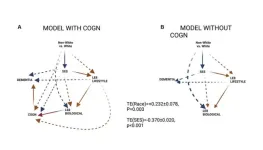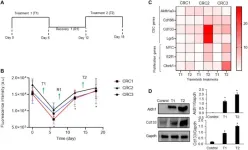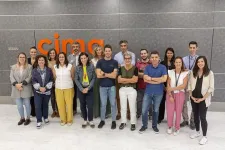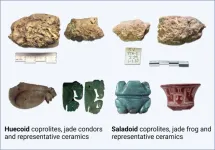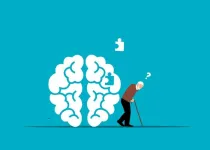(Press-News.org) MINNEAPOLIS – Among people who report memory and thinking problems, some show no signs of a problem on standard tests, while others have subtle declines on their tests. A new study shows that people who have subtle problems with these tests may have an increased risk of developing mild cognitive impairment, which can be a precursor to dementia. The study is published in the October 11, 2023, online issue of Neurology®, the medical journal of the American Academy of Neurology.
“Several studies have found that people with subjective cognitive decline have an increased risk of dementia,” said study author Michael Wagner, PhD, of the German Center for Neurodegenerative Diseases in Bonn. “Our results now suggest that people with subjective cognitive decline who also have minor test deficits, or early signs of memory and thinking problems not yet reaching the diagnosis of mild cognitive impairment, may be more likely to progress to memory disorders. Testing for these deficits in people with self-reported decline could help identify people at a higher risk for progressing to mild cognitive impairment.”
The study involved 439 people with subjective cognitive decline with an average age of 71 who did not have dementia or mild cognitive impairment.
Participants completed a series of tests to assess thinking and memory skills. Tests included memorizing lists, copying a drawing, correctly identifying time frames and current location. Minor test deficits was defined as having a score of at least 0.5 standard deviations below the average score.
Mild cognitive impairment was diagnosed by a panel of researchers who reviewed each participant´s performance across several tests. A test score of at least 1.5 standard deviations below the average was necessary for a diagnosis of mild cognitive impairment.
Of those with subjective cognitive decline, 13 %, or 55 people, had minor test deficits at the start of the study and 87%, or 384 people, did not have the minor deficits. Then the participants were followed for an average of three years to see who developed mild cognitive impairment.
After adjusting for age and sex, researchers found that people with subjective cognitive decline who also had minor test deficits were more than four times more likely to progress to mild cognitive impairment compared to people without minor deficits.
Researchers found that among the people with subjective cognitive decline, 17%, or 58 people, who did not have minor deficits, and 48%, or 24 people, who did have minor deficits, progressed to mild cognitive impairment.
Researchers also found that people with subjective cognitive decline and minor test deficits had a 36% probability of developing mild cognitive impairment within two years and an estimated probability of 84% of developing mild cognitive impairment within four years.
They also found that people with subjective cognitive decline and minor test deficits had higher levels of biomarkers measuring protein changes in the brain, indicating an increased risk of Alzheimer’s disease.
“Our results shed new light on the link between subjective and objective decline before being diagnosed with Alzheimer’s dementia,” said Wagner. “Future research may help doctors to measure and communicate individual risk for people with subjective cognitive decline.”
A limitation of the study was that it only included people of European ancestry, so it may not be generalizable to people from other populations.
The study was supported by the German Center for Neurodegenerative Diseases.
Learn more about dementia at BrainandLife.org, home of the American Academy of Neurology’s free patient and caregiver magazine focused on the intersection of neurologic disease and brain health. Follow Brain & Life® on Facebook, Twitter and Instagram.
When posting to social media channels about this research, we encourage you to use the hashtags #Neurology and #AANscience.
The American Academy of Neurology is the world’s largest association of neurologists and neuroscience professionals, with over 40,000 members. The AAN is dedicated to promoting the highest quality patient-centered neurologic care. A neurologist is a doctor with specialized training in diagnosing, treating and managing disorders of the brain and nervous system such as Alzheimer’s disease, stroke, migraine, multiple sclerosis, concussion, Parkinson’s disease and epilepsy.
For more information about the American Academy of Neurology, visit AAN.com or find us on Facebook, Twitter, Instagram, LinkedIn and YouTube.
END
New study finds link between subjective and objective memory decline
2023-10-11
ELSE PRESS RELEASES FROM THIS DATE:
New guidance issued on the determination of brain death
2023-10-11
MINNEAPOLIS – New guidance has been issued for clinicians on the determination of brain death, also known as death by neurologic criteria. A new consensus practice guideline, developed through a collaboration between the American Academy of Neurology (AAN), the American Academy of Pediatrics (AAP), the Child Neurology Society (CNS), and the Society of Critical Care Medicine (SCCM) is published in the October 11, 2023, online issue of Neurology®, the medical journal of the American Academy of Neurology.
This guideline updates the 2010 AAN ...
Insights on disparities in dementia from the UK Biobank study
2023-10-11
“The present study is among few to examine racial/ethnic disparities in dementia risk and their related pathways [...]. It is the first to do so in a UK population.”
BUFFALO, NY- October 11, 2023 – A new research paper was published in Aging (listed by MEDLINE/PubMed as "Aging (Albany NY)" and "Aging-US" by Web of Science) Volume 15, Issue 18, entitled, “Pathways explaining racial/ethnic and socio-economic disparities in dementia incidence: the UK Biobank study.”
Pathways explaining racial/ethnic disparities ...
Suppression of cancer stemness and drug resistance via BRAF/EGFR/MEK inhibition in colorectal cancer cells
2023-10-11
“[...] our approach enables mechanistic studies of drug resistance with 3D cultures of primary cancer cells to develop and test treatments that suppress cancer [...].”
BUFFALO, NY- October 11, 2023 – A new research paper was published in Oncotarget's Volume 14 on October 4, 2023, entitled, “Inhibiting BRAF/EGFR/MEK suppresses cancer stemness and drug resistance of primary colorectal cancer cells.”
Drug resistance is a major barrier against successful treatments of cancer patients. Gain of stemness under drug pressure is a major mechanism that renders treatments ineffective. Identifying ...
Epiphytes, amazing plants like moss and bromeliads found in trees, face growing threats
2023-10-11
Orchids, mosses, ferns—or epiphytes, defined as nonparasitic plants that grow on other plants—are crucial for Earth’s biodiversity and play essential roles in forests around the world, building habitat in trees for myriad other life forms, from bacteria and insects to birds and reptiles.
However, the very attributes that have enabled epiphytes to thrive in forest canopies are now making them vulnerable to both natural and human-caused disturbances, according to Nalini Nadkarni, the University of Utah biologist renowned for her pioneering work studying and conserving treetop ecosystems.
In a study published this month, Nadkarni found these vital plants ...
AI speeds up identification brain tumor type
2023-10-11
What type of brain tumor does this patient have? AI technology helps to determine this as early as during surgery, within 1.5 hours. This process normally takes a week. The new technology allows neurosurgeons to adjust their surgical strategies on the spot. Today, researchers from UMC Utrecht and researchers, pathologists and neurosurgeons from the Princess Máxima Center for pediatric oncology and Amsterdam UMC have published about this study in Nature.
Every year, 1,400 adults and 150 children are diagnosed with a tumor in the brain or spinal cord in the Netherlands. Surgery is often the ...
A new way to erase quantum computer errors
2023-10-11
Quantum computers of the future hold promise in solving all sorts of problems. For example, they could lead to more sustainable materials, new medicines, and even crack the hardest problems in fundamental physics. But compared to classical computers in use today, rudimentary quantum computers are more prone to errors. Wouldn't it be nice if researchers could just take out a special quantum eraser and get rid of the mistakes?
Reporting in the journal Nature, a group of researchers led by Caltech is among the first to demonstrate a type of quantum eraser. The physicists show that they can pinpoint and correct for mistakes in quantum computing ...
Blocking an immune molecule reduces tumor growth and prolongs survival in animal models of the most aggressive childhood cancer
2023-10-11
Researchers from Cima and the Clínica Universidad de Navarra, together with the international cooperative group Diffuse Midline Glioma (DMG-ACT), have confirmed that blocking an immune checkpoint molecule reduces the tumor and prolongs survival in animal models of the most aggressive childhood cancer. This research, carried out at the Cancer Center Clínica Universidad de Navarra, shows that inhibition of TIM-3 promotes the immune memory of diffuse intrinsic stem glioma (DIPG) and improves the prognosis of the disease.
DIPG is an aggressive brain stem tumor and the leading cause of death related to pediatric cancer. Due to its location therapeutic ...
Mummified poop reveals pre-Columbian cultures of the Caribbean consumed a diversity of plants, with peanuts, papaya, maize, and even cotton and tobacco detected
2023-10-11
DNA analysis of mummified poop reveals two pre-Columbian Caribbean cultures ate a wide variety of plants, like maize, sweet potato, and peanuts—and tobacco and cotton traces were detected too, according to a study published October 11, 2023 in the open-access journal PLOS ONE by Jelissa Reynoso-García from the University of Puerto Rico, Puerto Rico, and colleagues.
Mummified poop, or coprolites, can reveal clues to diet and lifestyle. In this study, Reynoso-García and colleagues analyzed plant DNA isolated from coprolites sampled from archeological sites of two pre-Columbian cultures (Huecoid and Saladoid) to see what these peoples ate ...
Risk factors for dementia vary by ethnicity, study finds
2023-10-11
Modifiable risk factors—including hypertension, obesity, diabetes, low HDL cholesterol and sleep disorders—confer a higher risk of dementia for people in some minority ethnic groups compared to White people, according to a new study published this week in the open-access journal PLOS ONE by Naaheed Mukadam of University College London, UK, and colleagues.
The number of people with dementia is on the rise around the world. There has been increasing interest in potentially modifiable risk factors, ...
Study links selfies to higher ratings of slimness
2023-10-11
In a new study, participants tended to rate women’s bodies as slimmer when viewed in selfie photographs than in photographs taken from other angles. Ruth Knight of York St John University, UK, and Catherine Preston of the University of York, UK, present these findings in the open-access journal PLOS ONE on October 11.
Popular on social media, selfies are portraits taken by the photo’s subject, who positions the camera away from their body but pointed back at themself. Prior research has suggested that viewing selfies might affect viewers’ judgments of the photo subjects’ attractiveness and could, in some cases, lead to ...
